In the media is a fortnightly round-up of features written by, about or containing female writers that have appeared during the previous fortnight and I think are insightful, interesting and/or thought provoking. Linking to them is not necessarily a sign that I agree with everything that’s said but it’s definitely an indication that they’ve made me think. I’m using the term ‘media’ to include social media, so links to blog posts as well as as traditional media are likely and the categories used are a guide, not definitives.
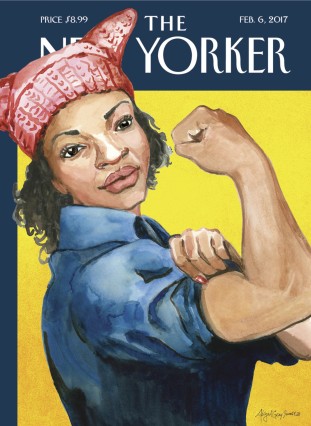
Image by Abigail Grey Swartz
Where is there to start other than with articles about the new American regime?
On the Women’s March:
- Paula Akpan, ‘Women’s March and the Selective Memory of Mainstream Feminism‘ on Galdem
- Ijeoma Oluo, ‘When You Brag That The Women’s Marches Were Nonviolent‘ on The Establishment
- Ashley Weatherford, ‘What Does It Take to Make You March?‘ on The Cut
- Kara Brown, ‘I Want to Trust the Women’s Marchers‘ on Jezebel
- Stephanie Boland, ‘What will happen to women’s rights now that Donald Trump is President?‘ in The New Statesman
- Zoë Beaty, ‘Why are we still so surprised when men stand up for women’s rights?‘ on The Pool
- Josephine Livingstone, ‘The Problem With “Pussy”‘ on New Republic
- Janet Mock’s Speech on The Cut
- Gaby Hinsliff, ‘How Susanna and Piers came to represent reason versus populism‘ on The Pool
- Sady Doyle, ‘The March Was Flawed and Messy and Glorious‘ in Elle
- Ann Friedman, ‘Was This Your First March? Don’t Stop Now.‘ on The Cut
- Rebecca Traister, ‘The Future of the Left Is Female‘ on The Cut
- Bim Adewunmi, ‘The Road Women Marched On This Weekend Was Paved By Black Resistance‘ on Buzzfeed
- Vonny Moyes, ‘Why do we still march, you ask? Because there’s still work to do‘ in The National
- Zoe Williams, ‘Memo to Piers Morgan: Why do we march? It’s not just protest, it’s about love‘ in The Guardian
- Jia Tolentino, ‘The Radical Possibility of The Women’s March‘ in The New Yorker
- Angela Davis’ Speech on Elle
- Megan Garber, ‘The Inauguration, and the Counter-Inauguration‘ on The Atlantic
- Eve Ensler, ‘The Women’s March heralds a renaissance of resistance‘ in The Guardian
- Rebecca Traister, ‘The Complicated, Controversial, Historic, Inspiring Women’s March‘ in The Cut
- Poorna Bell, ‘As A Woman Of Colour, This Is What Women’s March London Means To Me‘ on Huffington Post
- Lauren Elkin, ‘When women march, they are seen. And they are heard‘ on The Pool
- Heidi Mitchell, ‘I’m Anti-Trump, But I Refuse to March‘ in The Cut
- Ann Friedman, ‘A March Can Change Your Life‘ in The Cut
- Linda Sarsour, ‘#WhyIMarch‘ on Women’s Media Centre
On Melania:
- Megan Garber, ‘On Pitying Melania‘ on The Atlantic
- Jess Zimmerman, ‘Compassion for Melania Is Misguided — But It Isn’t Wrong‘ on The Cut
- Roxana Robinson, ‘Donald Trump: Making the Word ‘Pussy’ Great Again, Bigly‘ on Literary Hub
- Marisa Bate, ‘Should we feel sorry for Melania Trump?‘ on The Pool

On American society under Trump:
- Camille Dungy, ‘Unwelcome in My Country, Unwelcome in My Church‘ on Literary Hub
- Mehrsa Baradaran, ‘I Was a “Terrorist Country” Refugee Who’d Grown Up Shouting “Death to America.” America Trusted Me Anyway.‘ on Slate
- Andrea Pitzer, ‘What We Get Wrong About Hannah Arendt‘ on Longreads
- Lee Matalone, ‘R.I.P. #8: Inauguration Day‘ on The Rumpus
- Rebecca Traister, ‘Fake News, Fake Science and Why Doctors Lie About Abortion‘ on The Cut
- Tyrese Coleman, ‘How I Lost My Hometown‘ on Catapult
- Marilynne Robinson, ‘With President Trump, American democracy faces its greatest test‘ in The Guardian
- Yaa Gyasi, ‘Why the next four years will be a test for all of us‘ in The Guardian
- Katie MacBride, ‘Why Today Feels Like Grieving The Loss Of A Loved One‘ on The Establishment
- Lisa Ko, ‘20 Lessons on How to Be American‘ on The Offing
- June Eric-Udorie, ‘Nobody can inspire like Michelle Obama can inspire‘ on The Pool
- Ann Patchett, ‘Barack Obama, Our President of Love‘ in Time
- Alana Semuels, ‘Do Regulations Really Kill Jobs?‘ on The Atlantic
- Kathryn VanArendonk, ‘Why You Should Watch Donald Trump’s Inauguration‘ on Vulture
- Allison Robicelli, ‘I Work in the Restaurant Industry. Obamacare Saved My Family’s Life.‘ on Eater
- Sady Doyle, ‘It’s Time to Take Sexism Seriously as a Political Force‘ in Elle
- Emily Ladau, ‘I’m A Disabled Woman Who’s NOT Celebrating Meryl Streep’s Golden Globes Speech‘ on The Establishment
- Gaby Hinsliff, ‘Meryl Streep’s anti-Trump speech is brave and brilliant in the face of intimidation ‘ on The Pool
- Rebecca Traister, ‘WARNING: Abortion’s Deadly DIY Past Could Soon Become Its Future‘ in The Cut
On Trump:
- Niamh Ní Mhaoileoin, ‘Like any woman working with a misogynist, Theresa May should call out Donald Trump’s sexism‘ in The New Statesman
- Adrienne Lafrance, ‘Calling Out a Presidential Lie‘ in The Atlantic
- Laurie Penny, ‘Searching for Time-Travelers on the Eve of the Trump Inauguration‘ on Pacific Standard
- Olga Kazan, ‘How to Overcome Political Irrationality About Facts‘ on The Atlantic
- Ruby Lott-Lavigna, ‘What does it mean for a leader when their entire country’s music culture rejects them?‘ in The New Statesman
- Jill Abramson, ‘‘Alternative facts’ are just lies, whatever Kellyanne Conway claims‘ in The Guardian
- Robin Wright, ‘Trump’s Vainglorious Affront to the C.I.A.‘ in The New Yorker
- Molly Crabapple, ‘Trump’s here. We have four years to write a better story‘ in The Guardian
- Helen Lewis, ‘Stop saying identity politics caused Trump‘ in The New Statesman
- Sara Nović, ‘Rhyme & Reason: Sign Language’s Anti-Authoritarian Streak‘ in Blunderbuss
- Molly Ball, ‘Welcome to the Trump Presidency‘ on The Atlantic
- Mona Eltahawy, ‘Welcome to a new era of politically sanctioned patriarchy‘ in The Guardian
- Sabine Heinlein, ‘A Prisoner’s View of the Trump Administration‘ on Literary Hub
- Amanda Hess, ‘Trump, Twitter and the Art of His Deal‘ in The New York Times
- Rebecca Solnit, ‘From Lying to Leering‘ in The LRB
- Dani Garavelli, ‘May caught in Trump’s post-truth trap‘ in The Scotsman

The best of the rest:
On or about books/writers/language:
- Roxane Gay, ‘On Empathy, Race, and the Work of Alice Childress‘ on Literary Hub
- Sarah Perry, ‘‘I was weak, despairing, confused’: did writing a novel make me ill?‘ in The Guardian
- Sheila Kohler, ‘After losing my sister to a violent death, I turned to the solace of writing‘ on The Pool
- Lyz Lenz, ‘Taking a Stand with Roxane‘ on The Rumpus
- Julie Scelfo, ‘How Clara Hale and Audre Lorde Helped to Make New York‘ on Literary Hub
- Mariah Stovall, ‘On Falling Out of Love with Punk (and in Love with Books)‘ on Literary Hub
- Manjula Martin, ‘Against Fame: On Publishing, Popularity, and Ambition‘ on Catapult
- Melissa Febos, ‘The Heart-Work: Writing About Trauma as a Subversive Act‘ on Poets & Writers
- Adelia Saunders, ‘The Power and Politics of Language, from Oppressor to Oppressed‘ on Literary Hub
- Ottessa Moshfegh, ‘Finding Meaning in Going Nowhere‘ on The Atlantic
- Amanda Coe, ‘The Body in the Frame‘ on Huffington Post
- Sarah Hughes, ‘People, the final frontier: how sci-fi is taking on the human condition‘ in The Guardian
- ‘Meet the new faces of fiction for 2017‘ in The Guardian
- Clare Thorp, ‘Why we still need bookshops – in 2017 and always‘ on The Pool
- Diana Athill,’on Molly Keane: ‘I admired many authors. But Molly, I loved’‘ in The Guardian
- Janine Mikosza, ‘How Not to Speak Polish: On Language, Pain and (Not) Writing Memoir‘ on Electric Literature
- Christina Sharpe, ‘The Weather‘ on The New Enquiry
- Teow Lim Goh, ‘Tenacity, the Key to the Writing Life‘ on Literary Hub
- Danuta Keen, ‘The Da Vinci Code code: what’s the formula for a bestselling book?‘ in The Guardian
- Samantha Ellis, ‘How sibling rivalry made Anne the ‘neglected’ Brontë‘ on Penguin
- Anna Mazzola, ‘Bad Women: Do We Still Demonise Female Offenders?‘ on The Platform
- Emma Flint, ‘What makes the ‘perfect’ murder?‘ on PanMacmillan
- Alana Massey, ‘The Unbearable Niceness of Being‘ on Literary Hub
- Elizabeth Day, ‘Reading about nature is pure comfort when the world is full of chaos‘ on The Pool
- Emily Temple, ‘A Brief Survey of the Great American Novel(s)‘ on Literary Hub
- Lucy Worsley, ‘Jane Austen at 200: still a friend and a stranger‘ in The Guardian
- Tessa Hadley, ‘Some of my best ideas come in the bath’ in The Guardian
- Joanne Harris, ‘On Ghostwriting, Celebrity and That Guardian Review.‘ on her blog
- Susanna Rustin, ‘Winifred Holtby: author, feminist, campaigner‘ in The Guardian
- Katherine Arden, ‘on the landscape that inspired The Bear and the Nightingale‘ on Penguin
- Cathy Rentzenbrink, ‘Reading Lives‘ on International Literature Showcase
- Ruth Graham, ‘Why This Norwegian Novelist Should Be the Next Elena Ferrante‘ on Slate
- Eimear McBride, ‘The problems with erotica‘ in The New Statesman
- Samantha Ellis, ‘The Brontës’ very real and raw Irish roots‘ in The Irish Times
- Samantha Ellis, ‘The Brontës and Hester Chapone‘ on Brontë Blog
- Min Jin Lee, ‘On Selling Your First Novel After 11 Years‘ on Literary Hub
- Fiona Macdonald, ‘The Racy Side of Jane Austen‘ on The BBC
- Katherine Cowdrey, ‘Khorsandi withdrew from Jhalak Prize for fear of ‘alienating’ audience‘ in The Bookseller
- Noo Saro-Wiwa, ‘Playboy cars and pentecostal stars‘ in The TLS
- Emma Geen, ‘The Unbearable Lightness of ‘Being an Author’‘ on her blog
- Samantha Ellis, ‘Where are all the heroine mothers in fiction?‘ on The Pool
- Emily Gould, ‘Most Women In Publishing Don’t Have The Luxury Of Being Unlikable‘ on Buzzfeed

Personal essays/memoir:
- Evelyn Hampton, ‘Weightlessness‘ on Catapult
- Susan C. Ryan, ‘A Disaster Not to Be Found: On Survival (and Ultrasounds)‘ on Catapult
- Linda Chavers, ‘Fluids‘ on The Rumpus
- Porochista Khakpour, ‘Portrait of the Artist as a Debut Novelist‘ on Literary Hub
- Caroline O’Donoghue, ‘The pros and cons of growing up in a Naked House‘ in The Pool
- Jennifer Maritza McCauley, ‘But There Is Also Rosa‘ on Passages North
- Enuma Okoro, ‘This is your morning‘ on Aeon
- D.M. Moehrle, ‘Womanly Arts‘ on The Rumpus
- Leia Menlove, ‘Drowning Little Things‘ on Catapult
- Zara Rahmen, ‘Close Calls‘ on Real Life
- Anjali Enjeti, ‘Drinking Chai to Savannah: Reflections on Identity, Inclusion and Power in the South‘ on Longreads
- Hermoine Holby, ‘rediscovering 60s ye-ye icon françoise hardy in the 90s‘ in i-D
- Noël Duan, ‘Beauty Shopping With My Mother, a Former Cultural Revolution Red Guard‘ on Racked
- Jody Allard, ‘Why I’ve Given Up On Being Healthy‘ on Buzzfeed
- Monica Uszerowicz, ‘Survivor Syndrome; or, Snacking While Jewish‘ on Avidly
- Angela Chen, ‘Why I No Longer Make Predictions‘ on Catapult
- Robyn Wilder, ‘My husband is the better parent – and it rankles‘ on The Pool
- Alice Jolly, ‘Donor siblings: do the ties of blood matter?‘ in The Guardian
- Lauren Alwan, ‘Arab Past, American Present: My Family’s Invisible History‘ on Catapult
- Laura Michele Diener, ‘Late Afternoon with Shadows Lengthening‘ on Numéro Cinq
- Laurie Frankel, ‘How do grandparents respond when their grandson becomes a granddaughter?‘ on The Pool
- Kathleen Alcott, ‘‘Restaurants have taught me who I am’‘ in The Guardian
- Charlotte Shane, ‘When Desire Goes Dark‘ on Hazlitt
- Nicky Loomis, ‘Pinecone Man‘ on Catapult
- D.S. ‘On Faith and Sexuality‘ on Dardishi
- Jamila Osman, ‘A Map of Lost Things: On Family, Grief, and the Meaning of Home‘ on Catapult
- Alexandra Heminsley, ‘The emotional challenges of IVF, and how one woman found solace in the sea‘ on The Pool
- Rowan Hisayo Buchanan, ‘The Woman Scared of Her Own Kimono‘ on Catapult
- Laura Goode, ‘Against Confession: On Intersectional Feminism, Radical Catholicism, and Redefining Remorse‘ on Longreads
- Isabel Hardman, ‘When my mind stopped working, I realised just how badly we treat mental health‘ in The Telegraph
- Anne Helen Peterson, ‘Living In The Beautiful Bubble Of The Not-Quite Internet‘ on Buzzfeed
- Alexandra Heminsley, ‘My swimming odyssey: ‘It felt like a last chance to prove what I was capable of’‘ in The Guardian
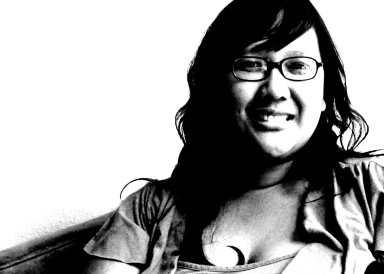
Feminism:
- Jessye McGarry, ‘Why I’m Waiting for The Right Man to Tell Me I Should Read ‘Infinite Jest’‘ on Reductress
- Diane Shipley, ‘The sexist reality of being a woman with M.E.‘ on The Pool
- Moira Weigel, ‘How Ultrasound Became Political‘ on The Atlantic
- J.C. Pan, ‘Love’s Labor Earned‘ on Dissent
- Gaby Hinsliff, ‘Older motherhood offers women the ultimate in having it all‘ in The Guardian
- Rachel Monroe, ‘Sexual Assault in the Amazon‘ in The Cut
- Jen Palmares Meadows, ‘We Be Bleeding‘ on The Rumpus
- Sophie Wilkinson, ‘These Women Were all Prescribed the Pill – None of Them Needed it for Contraception‘ on The Debrief
- Clare Vaye Watkins, ‘A Trip of One’s Own‘ in New Republic
- Daisy Buchanan, ‘Media mockery of sex workers creates dangerous conditions for women‘ on The Pool
- Daisy Buchanan, ‘Casey Affleck’s Golden Globes win shows Hollywood’s double standard in action‘ on The Pool
- Meena Kandasamy, ‘Bengaluru attacks: Misogyny by night and day‘ on Aljazeera
- Lucy Rycroft-Swift, ‘I wore men’s clothes for a month – and it changed my life‘ on The F Word
- Connie Kuhns, ‘Strange Women‘ on Geist
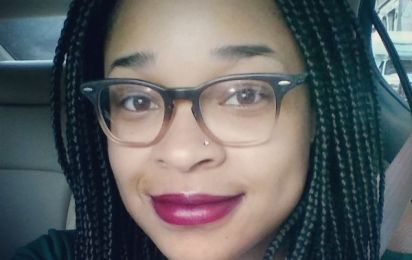
Society and Politics:
- Kathryn Hughes, ‘Embarrassing bodies: what did the Victorians have to hide?‘ in The Guardian
- Amelia Tait, ‘The myth of Generation Snowflake: how did “sensitive” become a dirty word?‘ in The New Statesman
- Michele Kirsch, ‘My life as a cleaner in London‘ in The Independent
- Julie Beck, ‘Does Corruption Happen Slowly, or All at Once?‘ on The Atlantic
- Tahmina Begum, ‘You Talk Like a White Girl‘ on gal-dem
- Amelia Tait, ‘The best days of the internet are over – now our privacy will suffer‘ in The New Statesman
- Deafinitely Girly, ‘Deaf Girly and the Gap advert‘ on her blog
- Ruby Tandoh, ‘Bad fad – on how clean eating turned toxic‘ in The Guardian
- Vanessa Hua, ‘You might be thinking of someone else?‘ in The San Francisco Chronicle
- Ijeoma Oluo, ‘The Exploitation Of Martin Luther King Jr.’s Legacy By White Supremacy‘ on The Establishment
- L.A. Kauffman, ‘In 1971, the People Didn’t Just March on Washington — They Shut It Down‘ on Longreads
- Brooke Jarvis, ‘Who Decides Who Counts as Native American?‘ in The New York Times
- Clare Chambers, ‘Time to abandon marriage?‘ in The TLS
- Jennifer Young, ‘Peetskill Blues‘ on Hazlitt
- Toni Jensen, ‘Women in the Fracklands: On Water, Land, Bodies, and Standing Rock‘ on Catapult
- Morgan Jerkins, ‘In Search of Black Atlantis‘ on Hazlitt
- Melinda Wenner Moyer, ‘A bug for Alzheimer’s?‘ on Aeon
- Carly Silver, ‘How Ancient Cure-Alls Paved the Way for Drug Regulation‘ on The Atlantic
- Laurie Shrage, ‘We need a contract for co-parenting, not just for marriage‘ on Aeon
- Rachel Aviv, ‘How Albert Woodfox Survived Solitary‘ in The New Yorker
- Jo Marchant, ‘This 3,500-Year-Old Greek Tomb Upended What We Thought We Knew About the Roots of Western Civilization‘ on Smithsonian
- Kathleen Hale, ‘Murder on Union Hill Road‘ on Hazlitt
Film, Television, Music, Art, Fashion and Sport:
- Emily Yahr, ‘From guilty pleasure to Emmy Awards: The delightfully weird history of Lifetime movies‘ in The Washington Post
- Victoria Coren Mitchell, ‘I’m so glad to spoil this film for you‘ in The Guardian
- Frances Katz, ‘Is Your TV Turned On? True Stories from the Cable Trenches‘ on Catapult
- Limara Salt, ‘Why are interracial relationships so rare in film?‘ on The Pool
- Helena Fitzgerald, ‘Bruce Springsteen: The Ultimate Dad‘ on The Catapult
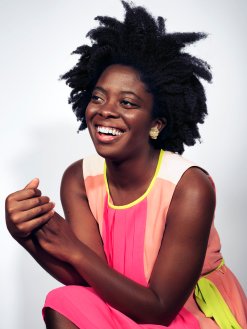
The interviews/profiles:
- Alexandra Kleeman on Bookanista in The Guardian
- Janie Chang and Shilpi Gowda on Literary Hub
- Cat Marnell in The Cut
- Roxane Gay in The New York Times and Vogue
- Sarah Pinborough in The Bookseller
- Joyce Carol Oates in The TLS
- Elizabeth Hand on Literary Hub
- Anne Applebaum on Spiegel
- Vic James on Reader Dad
- Yaa Gyasi in The Bookseller and The Guardian
- Claudia Rankine in The New Yorker
- Fiona Melrose on The Writes of Woman
- Kathleen Rooney on Literary Hub
- Mary Miller on Electric Literature
- Ayelet Waldman in The New York Times
- Bernadine Evaristo on the British Council
- Katherine Rooney on Electric Literature
- Erica Ferencik on Electric Literature
- Tara Betts on The Rumpus
- Ottessa Moshfegh on The Fanzine
- Elif Batuman in The New Yorker
- Xiaolu Guo in The Guardian
- Lucy Jane Bledsoe on The Rumpus
- Emma Flint on Foyles and in The Bookseller
- Deborah Lipstadt in The Guardian
- Mary Karr on Lenny
- Jo Mazelis on Alephi
- Jhumpa Lahiri on Medium
- Lindsey Lee Johnson on Electric Literature

The regular columnists:
- Laurie Penny in The New Statesman
- Lucy Mangan in Stylist
- Roxane Gay in The Guardian US
- Yasmin Alibhai-Brown in The Independent
- Caitlin Moran in The Times
- Lauren Laverne in The Pool
- Ella Risbridger in The Pool
- Sali Hughes in The Pool
- Bim Adewunmi in The Guardian
- Sophie Heawood in The Guardian
- Eva Wiseman in The Observer
- Tracey Thorn in The New Statesman
- Chimene Suleyman and Maya Goodfellow on Media Diversified
- Josie Pickens on Ebony
- Bridget Christie in The Guardian
- Lizzy Kremer on Publishing for Humans
- Juno Dawson in Glamour
- Kashana Cauley on Catapult
- Louise O’Neill in the Irish Examiner
- Jendella Benson on Media Diversified
- Lola Okolosie in The Guardian
- Sarah Gerard, ‘Mouthful‘ on Hazlitt
- Books by Women We’d Love to See in English on Literary Hub

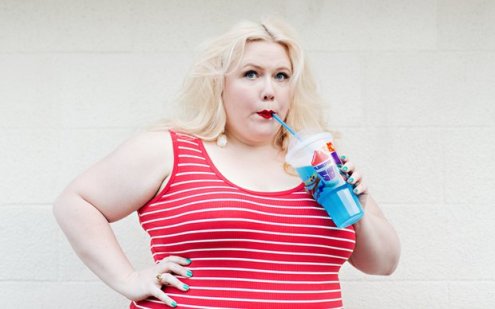
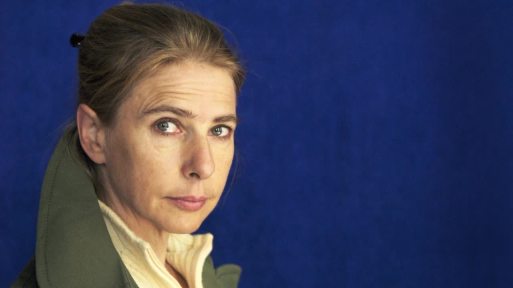















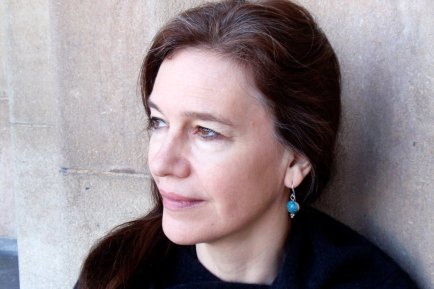




 Two excellent UK prizes – the
Two excellent UK prizes – the 






























